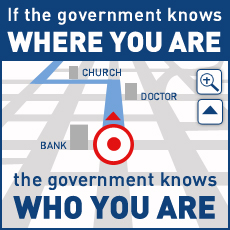
As we told you earlier, the Supreme Court ruled yesterday in U.S. v Jones that the government violated the Fourth Amendment when it used a GPS device to track a suspect’s location for 28 days without a valid warrant. It is fantastic privacy decision from the Court, and we’re hoping it also leads to some fantastic privacy decisions by Congress. The law must catch up with new technology; ask Congress to support the GPS Act now!
We’ll have more on the decision itself soon, but for the purpose of political analysis here are the facts you need to understand. The actual majority ruling rests on relatively narrow grounds, but a majority of the justices (in two concurrences) recognize that the long term monitoring of each and every single movement made by a person (in this case it was a month), no matter what technology is used, impinges on an individual’s reasonable expectation of privacy. In a concurrence written by Justice Samuel Alito, four justices go further and state unequivocally that use of a GPS device of this type is a search and should receive the full protection of the Fourth Amendment.
Justice Alito’s concurrence then urges legislators to properly address location privacy issues:
In circumstances involving dramatic technological change, the best solution to privacy concerns may be legislative. … A legislative body is well situated to gauge changing public attitudes, to draw detailed lines, and to balance privacy and public safety in a comprehensive way.
To date, however, Congress and most States have not enacted statutes regulating the use of GPS tracking technology for law enforcement purposes. The best that we can do in this case is to apply existing Fourth Amendment doctrine and to ask whether the use of GPS tracking in a particular case involved a degree of intrusion that a reasonable person would not have anticipated.
Justice Alito also notes that after a previous major Fourth Amendment case on wiretapping, “Congress did not leave it to the courts to develop a body of Fourth Amendment case law governing that complex subject. Instead, Congress promptly enacted a comprehensive statute”.
In sum, the Court has given Congress a good, strong push. They have clearly indicated that the Fourth Amendment is implicated and that there are countless technical and legal questions related to location tracking that lawmakers need to answer. They have also created strong encouragement for prosecutors (long the biggest bar to strong privacy protections) to make a deal. The Jones decision creates substantial uncertainty for prosecutors about when they need a warrant – something they will certainly want Congress to resolve. Given this case it is hard to imagine a careful prosecutor authorizing any type of location tracking (using either GPS or cell phone information) without probable cause under the Fourth Amendment.
Now it’s incumbent upon lawmakers to seize the initiative and resolve unanswered questions in the most privacy protective manner. A great way to do that is to support the GPS Act. This legislation, which has bipartisan support in both the House and the Senate, would require full warrant protection for all types of location tracking.
If you want to show your support for the GPS Act, please take action now!
Learn more about location tracking: Sign up for breaking news alerts, follow us on Twitter, and like us on Facebook.
Stay informed
Sign up to be the first to hear about how to take action.
By completing this form, I agree to receive occasional emails per the terms of the ACLU's privacy statement.
By completing this form, I agree to receive occasional emails per the terms of the ACLU's privacy statement.


